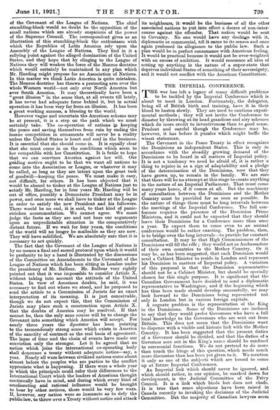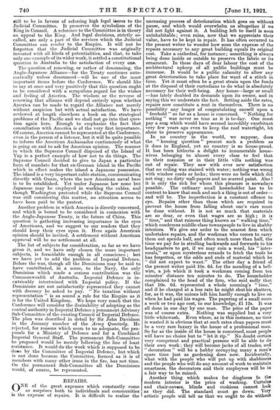THE IMPERIAL CONFERENCE.
THE war has left a legacy of many difficult problems to be tackled by the Imperial Conference which is about to meet in London. Fortunately, the delegates, being all of British birth and training, have it in their blood to hasten slowly. They are used to cautious experi- mental methods ; they will not invite the Conference to disaster by throwing at its head grandiose and airy schemes which do more credit to inventiveness than to good sense. Prudent and careful though the Conference may be, however, it has before it puzzles which might baffie the wisest statesman.
The Covenant in the Peace Treaty in effect recognizes the Dominions as independent States. This is only in accordance with the steadily growing demand of the Dominions to be heard in all matters of Imperial policy. It is not a tendency we need be afraid of, it is rather a thing to rejoice in as a sign of adaptability and a pledge of the determination of the Dominions, now that they have grown up, to remain in the family. We are sure that there will be no attempt at this stage to create anything in the nature of an Imperial Parliament. That must come many years hence, if it comes at all. But the machinery of consultation between the Dominions and the Mother Country must be provided for as soon as possible. In the nature of things there must be long intervals between the meetings of the Imperial Conference. The full con- ference requires the presence of the Dominion Prime Ministers, and it could not be expected that they should leave their Dominions for a Conference more than once a year. To expect them to come even to an annual conference would be rather exacting. The problem, then, is to bride over the long intervals—to provide for constant consultation. It may be that High Commissioners of the Dominions will fill the role ; they would act as Ambassadors of their own countries to the Mother Country. Or it may be, as has been suggested, that each Dominion would send a Cabinet Minister to reside in London and represent his Dominion in matters of Imperial policy. A variation of this proposal is that the Dominion representative should not be a Cabinet Minister, but should be specially chosen for this single purpose. It is significant that the Canadian Government have decided to send a diplomatic representative to Washington, and if the beginning which has thus been made should develop successfully, we may look forward to the Dominions being represented not only in London but in various foreign capitals. A cognate problem is the representation of the King in the Dominions. Some of the Dominions are inclined to say that they would prefer Governors who have a full local knowledge to the Governors who are sent out from Britain. This does not mean that the Dominions want to dispense with a visible and historic link with the Mother Country. It has been suggested that the present duties of a Governor should be divided, and that the duties of a Governor sent out in the King's name should be confined to ceremonial functions. We do not pretend to do more than touch the fringe of this question, which needs much more discussion than has been yet given to it. We mention it only as one of the subjects which are bound to come up at future Imperial Conferences. An Imperial link which should never be ignored, and which should rather, in our opinion, be marked down for devehipment, is the Judicial Committee of the Privy Council. It is a link which binds but does not chafe. It is true that some objections have been raised in Canada recently to invoking the decisions of the Judicial Committee. But the majority of Canadian lawyers seem still to be in favour of referring high legal issues to the Judicial Committee. It preserves the symbolism of the King in Council. A reference to the Committee is in theory an appeal to the King. And legal decisions, strictly so- called, are only a part of the services which the Judicial Committee can render to the Empire. It will not be forgotten that the Judicial Committee was originally invested with all kinds of potentialities, and that, to take only one example of its wider work, it settled a constitutional question in Australia to the satisfaction of every one.
The question of renewing, or rather of denouncing, the Anglo-Japanese Alliance—for the Treaty continues auto- matically unless denounced—will be one of the most important items before the Conference. We should like to say at once and very positively that this question ought to be considered with a scrupulous ,regard for the wishes and feeling of America. The wisdom or the reverse of renewing that alliance will depend entirely upon whether America can be made to regard the Alliance not merely without suspicion but with actual satisfaction. We have reviewed at length elsewhere a book on the strategical problems of the Pacific and we shall not go into that ques- tion again here. Enough to emphasize the fact that consultation with America is of the very first importance. Of course, America cannot be represented at the Conference, even in the person of a listener, but it will be quite possible to inform the American Ambassador continuously of what is going on and to ask for American opinion. The manner in which the Supreme Council disposed of the Island of Yap is a perfect example of how not to do things. The Supreme Council decided. to give to Japan a particular form of mandate for that ex-German island in the Pacific which in effect makes the island a Japanese possession. The island is a very important cable station, communicating directly with Guam, where the new American naval base is to be established. Yet under Japanese law none but Japanese may be employed in working the cables, and though Washington protested while the Supreme Council was still considering this matter, no attention seems to have been paid to the protest.
Another problem in which America is directly concerned, and which is bound to be considered in connexion with the Anglo-Japanese Treaty, is the future of China. This question is gathering increasing importance in the eyes of Americans, and we suggest to our readers that they should keep their eyes upon it. Here again American opinion should be invited. A settlement without American approval will be no'settlement at all.
The list of subjects for consideration, so far as we have given it, and we have only chosen the more important subjects, is formidable enough in all conscience ; but we have yet to add the problem of Imperial Defence. Before the war, though all the Dominions may be said to have contributed, in a sense, to the Navy, the only Dominion which made a serious contribution was the Commonwealth of Australia. Imperial Defence is in- extricably intertwined with Imperial policy. If the Dominions are not satisfactorily represented they cannot with decency be asked to pay. No taxation without representation " is as sound a rule for the Empire as it is for the United Kingdom. We hope very much that the Conference will consider the desirability of adopting as the central authority in Imperial Defence a permanent Advisory Sub-Committee of the existing Council of Imperial Defence. The plan was described in detail by Sir John Davidson in the January number of the Army Quarterly. He rejected, for reasons which seem to us adequate, the pro- posals for a Ministry of Defence and for a Combined Imperial General Staff. The permanent Sub-Committee he proposed would be merely following the line of least resistance. It would do the work which is supposed to be dose by the Committee of Imperial Defence, but which is not done because the Committee, formed as it is of members with many other irons in the fire, has not time. On the permanent Sub-Committee all the Dominions would, of course, be represented.



































 Previous page
Previous page